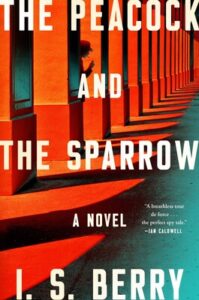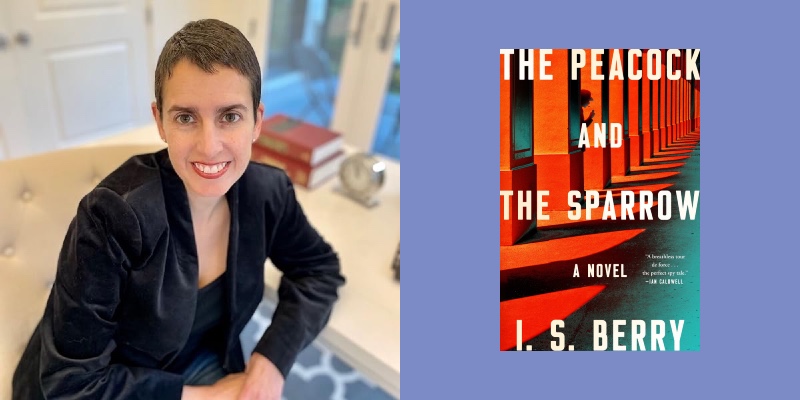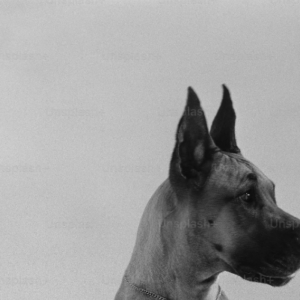For three months after its launch in May 2023, I.S. Berry’s spy novel was flying under the radar, as most debut novels do. Then a rave review from The New Yorker set off a firestorm of other favorable notices that resulted in numerous publications and National Public Radio naming it one of the best novels of year.
In a world where thousands of great books go unnoticed annually, I.S. Berry (her pen name) was the lucky one who was discovered for her talent and story by a publishing and media world that too often looks inward for more of the same, by the same, for its next round of similar enlightenment.
Berry’s novel, The Peacock and the Sparrow was also nominated for best debut novel by the Mystery Writers of America, the International Thriller Writers, and Deadly Pleasures quarterly magazine, yet it was still not a bestseller.
But at Bouchercon, the massive mystery/crime fiction convention held in San Diego in 2023, Berry’s novel sold out quickly. Her publisher, Atria (a Simon & Schuster imprint), noticed. Publishing is so arbitrary at times that publishing experts are often caught off guard. But what you can expect once they realize they have a winner, they go all in. Expect a major marketing push for the paperback release of The Peacock and the Sparrow. A book that reeks of bestseller status, it just may find its way to the top soon.
The Peacock and the Sparrow has been described as nuanced, realistic, and filled with twists and turns as it races to its conclusion. It’s based on the real-world dynamics of the Arab Spring. Berry knows of what she writes because she lived the life of a spy. And yet it wasn’t until her life as a case officer for the CIA had come to an end that she finally came up with the idea for the novel.
“It’s not a typical thriller novel. It doesn’t fit in a category,” she says. “It’s literary, and as much a human, character-driven story as a traditional espionage story. I also wanted to portray the unvarnished, dark, gritty side of spying, which most spy novels don’t…My book doesn’t glorify the agency at all…I tried to make Bahrain a character. I think it’s full-bodied and immersive in the time and place. I tried to make every detail authentic. Every detail in there is real, from the cocktails at Trader Vic’s to the way spies conduct dead drops to the expat villas.”
For a long time, she didn’t live the routine life of a spy. She didn’t schmooze potential contacts at embassy parties or get many chances to take them out for drinks at lunchtime. Instead, she became a counter-terrorism case officer during the war in Iraq and Afghanistan. As a case officer, her mission was to recruit sources, but she was stationed in the green zone in Baghdad, protected from her potential sources by walls and surrounded by the U.S. military. And she admits she was traumatized by the daily shelling and mortar fire that landed near her inside and outside the massive compound on a near-daily basis.
She often relied on walk-ins (to the zone) to become her latest assets but would sometimes venture into the red zone in an armored vehicle to pick up sources. Not exactly the romantic life for a young, single case officer. There was nothing glamorous about it and she captures that feeling in The Peacock and the Sparrow.
Berry was assigned to track down Al-Qaeda leader Abu Musab Al-Zarqawi, who was responsible for numerous suicide bombings and beheadings of Americans and other hostages. He was killed by U.S. bombs dropped on a safe house in 2006, several months after Berry left Iraq. The exact circumstances of his death are still murky, Berry says. She doesn’t know the particulars and if she did, she couldn’t talk about it. It is this uncertainty, which is pervasive in the spy game, that makes The Peacock and the Sparrow so compelling.
One source helped her track down an alleged terrorist target believed to be involved in a Baghdad attack. He was detained but never confessed. Today, she can’t say for sure if he’s guilty. She still wonders if they got the wrong guy. “It is something that has haunted me,” she says. “It’s still a weight on me.” It is yet another example of the ambiguity of the spy game. “The truth is elusive. You never know and you have to make peace with the unanswered questions.”
Berry was beguiled by foreign affairs while studying abroad at the London School of Economics. “I thought I’d be a civil rights lawyer, but I fell in love with the great beyond and wanted to explore.”
After graduation, she shoved everything she owned into a suitcase and moved to Prague where she lived in a small flat above the famed Roxy night club while making a sparse living at an online English-speaking newspaper. “I wanted to experience the world.”
It was there that she made her first attempt at a novel, but she readily admits that at that time, she had no experience and nothing to say.
She then she moved to Cambridge, England and worked for the U.S Department of Defense as a Balkans intelligence analyst. Having lived in Eastern Europe in the 1990s, she was already well-versed in transitional countries and “I loved intelligence. I loved being in the thick of foreign affairs.”
While on one of her frequent trips to Bosnia, someone told her the CIA needed more women case officers (spies) and suggested she apply. She did.
It took so long that she attended law school at the University of Virginia while waiting for the CIA to examine her application and run their background check. She focused on national security and international law. After graduation, she joined and later headed to the Middle East.
Years later after leaving the CIA, Berry returned to the U.S., got married, and practiced national security law until her son was born in 2010. She moved to Bahrain in early 2012 where her husband worked as a civilian for the Department of Defense as the Arab Spring was bubbling to the fore. Most Americans focused their attention on the events in Egypt, but Bahrain was a hotbed of protest against its autocratic government. It was also the battleground for a proxy war between Iran and Saudi Arabia. Berry was entranced by the politics.
“It was so fascinating. We were living in it,” she says.
Following their two-year stint, her family moved back to Virginia, but the ghosts of espionage were still imbedded in her soul. Her son was now in preschool, so she had some free time and decided to again try writing a novel. This time, she had extensive exposure to the world and had lots to say.
One of her struggles has been dealing with Post Traumatic Stress Disorder after first coming home from Iraq. “Your brain learns to live with this fear, trauma, and uncertainty…I really don’t know of anyone (who’s experienced war) who doesn’t deal with PTSD…We’re just not programed as humans to deal with it.”
She used her own time in war and everything else she experienced as a spy to mold her novel. Particularly the unanswered questions. She wanted to leave the reader feeling haunted, wondering what was unseen and what the story was behind the story to convey a visceral sense of espionage.
“Initially, I didn’t have a firm idea of what I wanted to write,” she says. She started with what she calls, “a spy-flavored thriller, but not a spy novel. I looked back and the espionage scenes had an authenticity that the rest of the book didn’t.” She began rewriting. It took five years.
Three years in, she said, “For a moment, I hated the story. I think every writer reaches that point. But I worked through it because fundamentally I believed in my book. You just have those moments of doubt.” Later, she notes, “I didn’t realize until the end how much of my own experience was in there.”
Critics have spoken of the realism in her writing. “One review I saw described my book as ‘equal parts literature, noir, and thriller.’”
Her novel focuses on Shane Collins, a world-weary CIA spy, who is stationed in Bahrain off the coast of Saudi Arabia for his final tour. He’s ready to call it quits when he starts to uncover Iranian support for the insurgency against the monarchy. Then he meets and falls for Almaisa, a beautiful and enigmatic artist. This enabled him to experience a part of Bahrain most expats never do.
When a trusted informant becomes embroiled in a murder, Collins finds himself caught in the crosswinds of a revolution. Drawing on all his skills as a spymaster, he sets out to learn the truth behind the Arab Spring, win Almaisa’s love, and uncover where Bahrain’s secrets end, and America’s begin.
Berry was now learning to become a writer. “I’d always wanted to write a novel. I didn’t think it was a practical profession.”
It was a lonely task she couldn’t fully share with others, not even her husband. Because she is former CIA, every manuscript she writes about spies has to be preapproved by the agency before she can share it with anyone. For that reason, she hadn’t gotten to know any writers to ask for help about the publishing business. So, ever the novice, she read what she could and queried about 15 agents. The response was immediate. Several expressed interest.
“I didn’t understand how audacious that was at the time. I think if I had known I would have been a lot more intimidated and not as bold. But I didn’t know what I didn’t know.”
She chose David McCormick because he represented a wide range of authors, and her book, as he pointed out, wasn’t a “genre” book. “He really loved my manuscript and seemed to really believe in me…Along the way there are people who really believe in you and that’s what I felt with him.” Especially, she says, because “my book is kind of a slow burn, not a shoot ‘em up novel.”
“When my agent was pitching to publishers, I suggested he submit to Peter Borland, who had edited Joseph Kanon, bestselling author of The Berlin Exchange. Peter ended up being the one. And my first blurb ended up coming from Kanon.”
When her book launched on May 30, 2023, she faced what most debut novelists endure. Silence. “I was so new to this I wasn’t part of the writers’ community. I thought it would get reviewed more. I had no reviews at first. It felt a little bit like shouting in an empty room.”
Publishers Weekly did give it a starred review, but others like Kirkus ignored it. “That was eye opening for me. And then I hustled to get events. I joined social media and got involved in the author community. I was blown away by how supportive other authors were.”
Her colleagues at the CIA embraced her as well. “Since my book was published, I’ve met with a lot of former case officers and even spoken to the CIA’s creative writing group, ‘Invisible Ink.’” It was the first time she’d set foot in the CIA’s Langley headquarters in 15 years.
“There are a fair number inside that world who want to write books,” she says.
But her watershed moment came after The New Yorker stumbled upon her book and later named it a best book of the year. That attracted other reviewers, even NPR. “Having the cache of The New Yorker really helped,” she says.
Since then, she has gotten a hoard of invitations from book clubs, including men’s book clubs. For a writer who had to wait so long to become part of the authors and readers community, it appears the neighborhood has finally opened its arms to her.
“Spying was definitely not like this,” she says.

___________________________________
The Peacock and the Sparrow
___________________________________
Start to Finish: 3 years to write, 2 years edit, CIA approval a few months
Decided to write a novel: First attempt in Prague, years later after her CIA and Bahrain tours.
Experience: CIA Case officer (spy who recruits human sources for information)
Agents Contacted: About 15 agents
Agent Rejections: 10-11
First Novel Agent: David McCormick
First Novel Editor: Peter Borland
First Novel Publisher: Atria (Simon and Schuster)
Inspiration: The texture of the world. What lies beneath the scenes. Secrets intrigue me. Graham Greene’s The Quiet American, Theodore Dreiser’s An American Tragedy, Jack Kerouac’s On the Road.
Website: https://isberry.net
Advice to Writers: Don’t be afraid to find a distinctive voice. Pick a story you love because writing is like a long-term relationship. There are moments you will hate your story. Read everything to find out what speaks to you and what doesn’t.
Like this? Read the chapters on Lee Child, Michael Connelly, Tess Gerritsen, Steve Berry, David Morrell, Gayle Lynds, Scott Turow, Lawrence Block, Randy Wayne White, Walter Mosley, Tom Straw. Michael Koryta, Harlan Coben, Jenny Milchman, James Grady, David Corbett. Robert Dugoni, David Baldacci, Steven James, Laura Lippman, Karen Dionne, Jon Land, S.A. Cosby, Diana Gabaldon, Tosca Lee, D.P. Lyle, James Patterson, Jeneva Rose, Jeffery Deaver, Joseph Finder, Patricia Cornwell, Lisa Gardner, Mary Kubica, and Hank Phillippi Ryan.

















